Gateway NV58 (Intel) - OS Benchmarks
Wrapping up our look at OS performance on the NV58, we have our OS boot/shut down, hibernate/resume, and sleep/wake test results. As with the NV52, there was a fair amount of variability between test runs. We took the best result of numerous runs for each OS. Once more, note that Windows XP will have an advantage in the hibernate/resume testing because we are using a 32-bit OS (3GB addressable RAM) instead of a 64-bit OS (4GB addressable RAM). No OS wins - or loses - in every single category, but Windows XP and Win7 are usually near the top and Ubuntu and Vista are near the bottom.
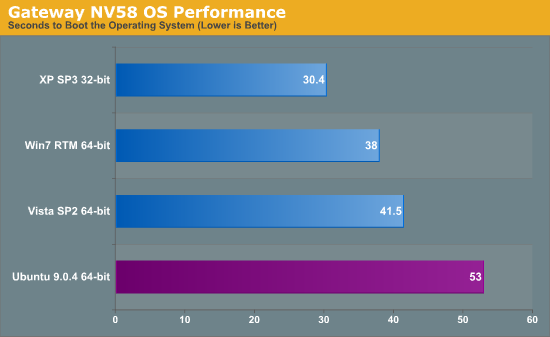
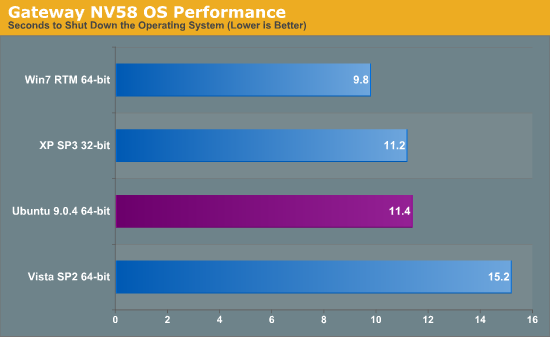
XP loads the fastest once again, this time leading the competition by a larger margin than on the NV52. Windows 7 takes 25% longer to boot, Vista takes 36% longer, and Ubuntu is in last at 74% longer than XP. The GRUB delay is a large portion of the poor showing for Ubuntu, though; it would be very close to the Vista result without the extra ~10 seconds. Shut down times new Windows 7 into the lead, with XP and Ubuntu essentially tied at around 15% longer than Vista bringing up the rear taking 55% longer than Win7.
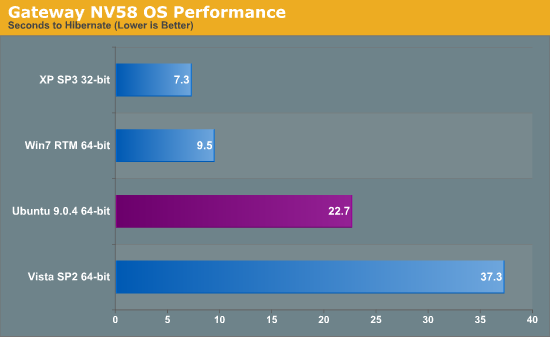
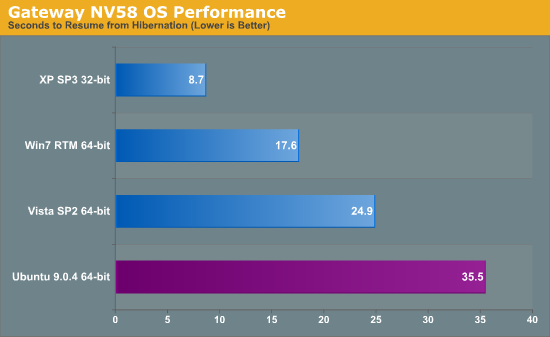
As expected, Windows XP leads in hibernate/resume times since it doesn't have to deal with as large of a hibernation file. Windows 7 trails XP in hibernate times by 30%, correlating very well with the difference in addressable memory. Ubuntu is in third place, requiring over three times as long to hibernate as XP (211% longer). The Vista result is the worst by far, taking 411% longer than XP. There's again the question of whether drivers are somehow at fault, but whatever the cause the NV58 took substantially longer to hibernate on Vista every single time. Resume times don't change the standings much, except Windows XP holds an even larger lead and takes less than half as long as the next closest competitor, Windows 7, which requires 102% more time. Windows Vista doesn't do as poorly in the resume times, though it still trails XP by 186%. Ubuntu is in last place taking just over four times as long to resume as XP, but again the 10 second GRUB penalty is at play.
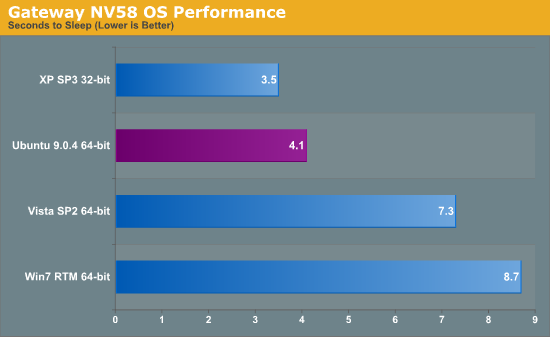
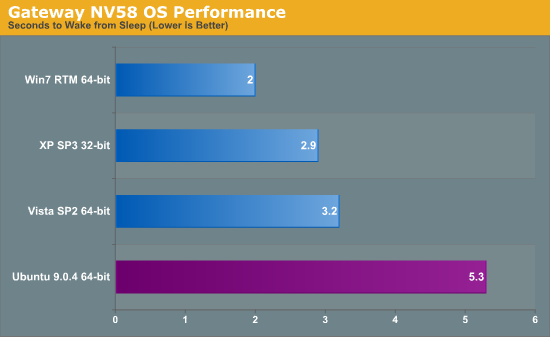
Finally, in sleep times Windows XP again leads, this time followed by Ubuntu which is very close at only 17% longer. Vista takes 109% longer than XP and for once Windows 7 brings up the rear requiring 149% longer than XP to go to sleep. Interestingly, Win7 is the fastest when it comes to waking, requiring just 2 seconds. XP and Vista are 45% and 60% longer, but they're both only around three seconds. Ubuntu is last taking 165% longer than Windows 7, with a result of 5.3 seconds. Since we're dealing with such short times with sleep/wake cycles, the raw percentages and charts aren't nearly as meaningful. As mentioned before, Ubuntu and Win7 tend to be a little more consistent, whereas the best-case results for XP and Vista can be an order of magnitude faster than the worst-case results. If nothing else, Ubuntu is very consistent at going to sleep in around 5-10 seconds; Windows 7 sleep times range from just under 9 seconds up to around 30 seconds, and XP and Vista can take over a minute to go to sleep at times. The difference between 5 seconds and 10 seconds is somewhat annoying, but it's not a huge issue unless you're putting your system to sleep constantly. Occasional delays of over a minute on the other hand can be truly frustrating. For what it's worth, toss in an SSD and the sleep/wake times all appear to be far more consistent (though we didn't conduct in-depth testing on either of these notebooks with SSDs).










106 Comments
View All Comments
PrinceGaz - Tuesday, September 22, 2009 - link
When surfing on my iTouch, I find that the vast majority of websites display almost the same (complete with images) despite the lack of Flash, and Java as well for that matter (it does at least support JS). There are just the odd undisplayed areas which in most cases are where I know ads would be normally. A very few websites use Flash for navigation and content display without any alternative version of the site available, but the overwhelming majority of sites display fine.That being said, I would prefer to have the option to enable Flash and/or Java if I wished, but would probably leave Flash off most of the time given the likely impact it would have on battery-life and overall responsiveness.
strikeback03 - Tuesday, September 22, 2009 - link
Is there a way to force a mobile version of ESPN that still displays all the links that are flash on the main site?emboss - Tuesday, September 22, 2009 - link
For day-to-day browsing I have flash turned off. Even on Windows it speeds things up, and as a bonus kills most of the ads that try and get around ad blocking. Excluding YouTube videos, I maybe have to enable it once a month or so to use a site that's broken enough to require it.Then again, I use the internet for information rather than entertainment, and things like MSDN don't require flash :)
sc3252 - Tuesday, September 22, 2009 - link
Flash isnt really a part, you can view most sites without it. The only sites that really need it are those crapy sites you really dont want to be at.Another nice point to make is how poorly optimized flash is for GNU/Linux. I am not surprised when using firefox without blocking flash you get such lower battery life since there is almost no acceleration on GNU/Linux. With a 3.2ghz core 2 I can't watch fullscreen flash without skipping and jerking on Debian testing.
pcfxer - Tuesday, September 22, 2009 - link
With my 2.9GHz Athlon X2 5000+ BE, 4GB RAM on PC-BSD 64-bit (with the stock nvidia drivers), I am able to view full screen HD flash without a hint of trouble. This is handled via binary emulation of Linux running Firefox linux with linux flash plugins.Perhaps, anand could test a REAL Unix-like OS and try out PC-BSD. It is MORE "free" than Linux (GPL).
pcfxer - Tuesday, September 22, 2009 - link
I realize that some people may mistake this "REAL Unix-like" for seriousness, it is a joke btw. That said, I am serious about testing PC-BSD - I am a tester for them anyhow ;).